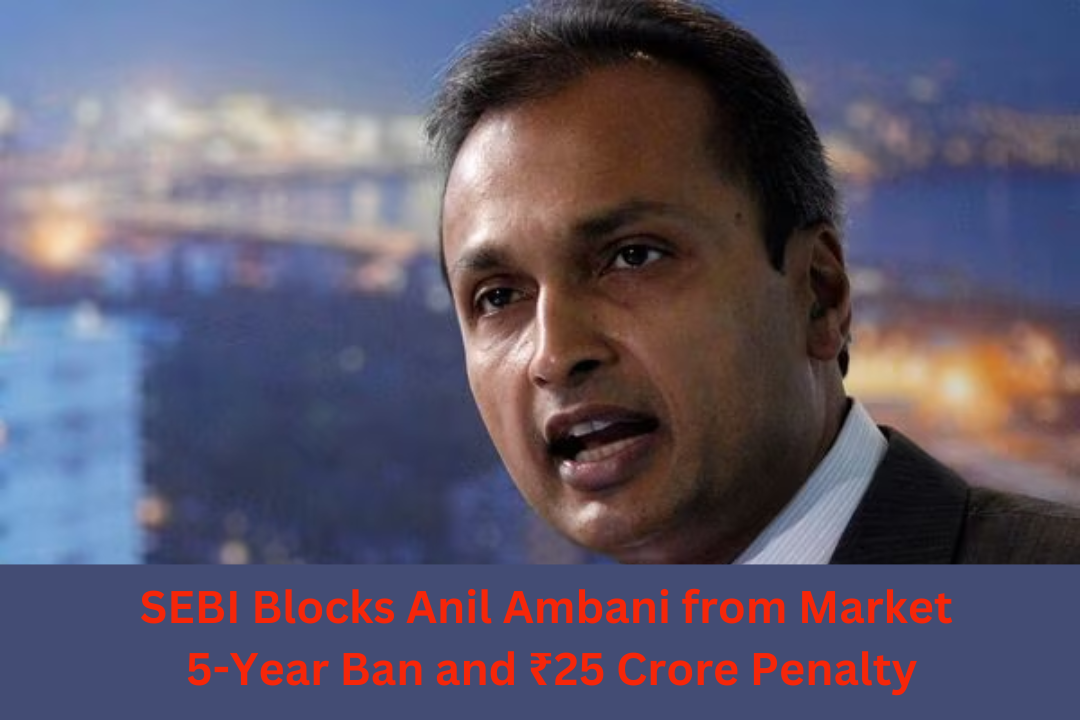Securities and Exchange Board of India (SEBI) has imposed a 5 Year ban on Anil Ambani, along with 24 others, from participating in the securities market. This decisive action was taken in response to the Reliance Home Finance Limited (RHFL) loan scandal. SEBI has also imposed a hefty ₹25 crore penalty on Ambani and the involved entities, marking a significant moment in the ongoing battle against financial mismanagement and corporate fraud.
Understanding the RHFL Loan Scandal: A Detailed Overview
The RHFL loan scandal has become a pivotal case in India’s financial landscape. The controversy revolves around alleged financial misdeeds and misappropriation of funds that directly affected the operations of Reliance Home Finance Limited, a subsidiary of Reliance Capital Limited. The scandal primarily focuses on misrepresentation of financial statements, diversion of funds, and fraudulent activities that led to a loss of investor trust and a significant downturn in the financial stability of RHFL.
Key Findings from SEBI’s Investigation
SEBI’s exhaustive investigation unearthed multiple layers of fraudulent activities. Some of the key findings include:
- Misrepresentation of Financial Statements: SEBI discovered that the financial statements of RHFL were manipulated to project a healthier financial condition than was actually the case. This misrepresentation was crucial in misleading investors and stakeholders.
- Diversion of Funds: A significant portion of funds raised by RHFL was allegedly diverted for purposes other than those disclosed to shareholders and regulatory bodies. These diversions, often routed through shell companies, severely impacted RHFL’s financial stability.
- Role of Key Individuals: SEBI identified the active involvement of top executives, including Anil Ambani, in orchestrating and facilitating these fraudulent activities. Their actions were deemed to be in violation of various sections of the SEBI Act and other regulatory guidelines.
The Legal Ramifications: A Landmark SEBI Order
The order issued by SEBI is among the strictest in recent times, signaling a zero-tolerance approach towards financial irregularities. The regulatory body has not only imposed a five-year ban on Anil Ambani and the other accused but also issued several other directives aimed at safeguarding the interests of investors. Key aspects of the order include:
- Five-Year Market Ban: Anil Ambani and 24 other associated entities have been barred from accessing or dealing in the securities market for a period of five years. This ban applies across all forms of securities, including equities, bonds, and mutual funds.
- ₹25 Crore Penalty: SEBI has levied a ₹25 crore penalty on the individuals involved, holding them jointly and severally responsible for the misappropriated funds. This penalty is intended to act as a deterrent to other corporate entities considering similar misconduct.
- Restriction on Directorships: Anil Ambani and several other key figures involved in the scandal have also been barred from holding any directorial positions in listed companies during the ban period.
Implications for Reliance Group and the Broader Market
The repercussions of this order extend beyond Anil Ambani and the other penalized individuals. The Reliance Group, already reeling from financial distress, is likely to face even greater challenges in raising capital and maintaining investor confidence. The scandal has severely dented the reputation of the group, leading to significant downgrades by credit rating agencies and a steep decline in stock prices.
For the broader market, SEBI’s ruling is a stern reminder of the consequences of financial misconduct. It serves as a precedent-setting case, reinforcing the need for corporate governance and transparency. Market analysts believe that the order could trigger a wave of regulatory scrutiny across other financial institutions, especially those with complex financial structures.
Corporate Governance Under Scrutiny
The RHFL case has reignited debates on corporate governance in India. Several governance lapses were highlighted during SEBI’s investigation, including:
- Weak Internal Controls: The absence of robust internal audit mechanisms and risk management systems allowed financial mismanagement to continue unchecked for an extended period.
- Inadequate Board Oversight: The board of directors failed to exercise their fiduciary duties effectively, allowing the top management to carry out fraudulent activities without accountability.
- Conflict of Interest: SEBI pointed out instances where transactions were structured in a way that benefitted related parties at the expense of shareholders and creditors.
Investor Reactions and Market Sentiment
The ban on Anil Ambani and others has generated mixed reactions among investors. While some see SEBI’s action as a necessary move to restore integrity in the financial system, others remain skeptical about the overall effectiveness of regulatory measures. The penalties imposed, though significant, have been criticized by some as being inadequate given the scale of the fraud.
The stock markets have shown volatility in the aftermath of SEBI’s order. Shares of companies associated with the Reliance Group have experienced sharp declines, reflecting investor concerns over future growth prospects and the group’s ability to recover from the financial and reputational damage.
Looking Ahead: What Does This Mean for Corporate India?
The SEBI ban on Anil Ambani and his associates is a watershed moment in the enforcement of corporate governance norms in India. It underscores the need for tighter regulatory frameworks and enhanced oversight mechanisms to prevent similar incidents in the future. Experts argue that while the existing laws are comprehensive, their implementation and enforcement need significant strengthening.
For corporate India, the RHFL scandal is a wake-up call. Companies must prioritize transparency, ethical business practices, and the implementation of strong internal control systems. Investors, on their part, are likely to be more cautious and discerning, focusing more on corporate governance practices before making investment decisions.
Conclusion: A New Era of Accountability?
SEBI’s decisive action against Anil Ambani and the others involved in the RHFL scandal marks a critical step towards greater accountability in India’s financial markets. The stringent measures, including the market ban and heavy penalties, send a clear message to the corporate sector: fraudulent activities will not go unpunished. As the dust settles, the long-term impact of this landmark decision on market practices and investor confidence will be closely watched.
Visit again financestock.in and subscribe for the latest updates llike a Maharashtra Bandh August 24: Metros, Hospitals, Banks – What’s Open and What’s Closed?

